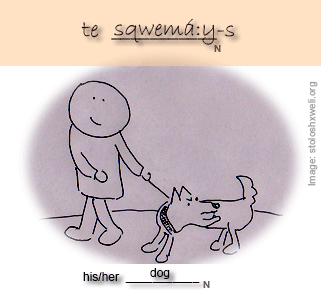Instead of saying the full phrase te __________-s tútl’o, you can ‘drop’ the word tútl’o and just say te ______s.
The person who possesses the noun will then just be understood from context, so te ______-s can mean either ‘his ____‘ or ‘her _____‘, depending on who your have been talking about. For example, you can say:
- te lá:lems – his/her house
- te méles – his child
- te sqwemá:ys – his dog
To be clear you can always add the tútl’o (or thútl’o, for ‘her‘), but in context Elders commonly just use the shorter pattern.


No comments yet.